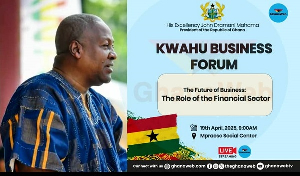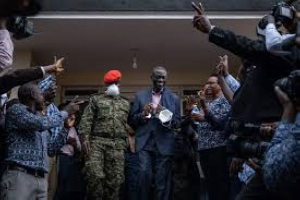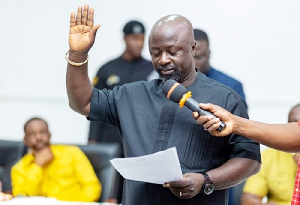A GNA Feature by Boakye-Dankwa Boadi
Accra, June 17, GNA - In the late 1970s when there was the oil boom in Nigeria and the petro-naira held sway, many Ghanaians left for Nigeria to assist their Economic Community of West Africa State (ECOWAS) brothers and sisters to savour their new found wealth. The first impression one got upon entering Nigeria was a country in a hurry to develop. The German Contractor Julius Berger was busy building "bridges over dry land" what one later learnt were interchanges in Lagos, the then capital city of Nigeria.
The Nouveaux-Riches were displaying their wealth by holding weekend parties for the not too much pecuniary endowed in the society. Most Ghanaians, regarded as strangers, were often invited to these free food joints. It was fashionable for the Nouveaux-Riches in Northern Nigeria to provide free koko with koose or akara in the mornings, tuo zaafi and amala in the afternoon and rice in the evenings for anybody, who cared to have free meals. This writer later learnt that the Nouveaux Riches used to boast: "If you have money and you spend it with your wives, children and relatives it means you do not have enough money. But if your money is enjoyed by people, who are not related to you that means you have money". Anybody, who was able to provide free food for strangers was addressed as "Ranka Yadede".
It was refreshing; therefore, when this writer learnt that the richest couple on the planet - Bill and Melinda Gates - had decided to make their money reach the poor and disadvantaged in Ghana through the Bill and Melinda Gates Foundation. The Foundation is sponsoring a programme aimed at increasing access to medicines by improving the systems through which drugs are supplied as well as improving the quality of drug products and pharmaceutical services.
As part of the global effort to enhance access to essential medicines for the neediest, Management Sciences for Health (MSH) in conjunction with the Ministry of Health, Ghana and in collaboration with the Rational Pharmaceutical Management Plus (RPM Plus) Programme will host the "Strategies for Enhancing Access to Medicines (SEAM) Conference 2005 in Accra from June 20 to June 22. US Agency for International Development (USAID) is funding the conference. The conference would bring together stakeholders to evaluate and discuss the programmes being implemented in some parts of Africa and Latin America.
The SEAM is a health care programme aimed at responding to the challenges of improving access to essential medicines in developing countries and the conference would enable the implementers and stakeholders to evaluate and discuss accomplishments, lessons learnt, impact, sustainability and the possibility of replicating the programme. Speaking at a press conference in Accra on Thursday, Mr Kwesi Eghan, Senior Technical Advisor of MSH, said the implementation of the SEAM in Ghana would be the special focus of the Conference. Mr Eghan, who is also the Field Project Manager, said countries that had benefited from the programme were Ghana, Tanzania, Kenya and El Salvador.
In all the countries, SEAM provided technical assistance to local partners to design and administer collaborative strategies for improving access to essential health commodities, particularly in underserved rural areas, where access was difficult. The focus of SEAM is also to increase private sector participation in the supply and distribution of drugs. In Ghana, the SEAM programme is being implemented with the assistance of the Pharmacy Council as per regulatory functions and the Ghana Social Marketing Foundation (GSMF) International to establish a franchise of chain shops of licensed chemical sellers who run "CAREshops". SEAM also works with the Catholic Drug Sector for the establishment of a pooled procurements system as well as to start a rational use of medicines programme.
Currently there are more than 7,000 licensed chemical shops in Ghana compared to about 1,000 pharmacy shops. Eighty five per cent of all the pharmacy shops are located in only three cities - Accra, Kumasi and Sekondi-Takoradi - while there are less than 20 pharmacy shops in the Northern, Upper East and Upper West Regions. The SEAM has so far worked with its partners to establish a number of the "CAREshops" in the Volta and Eastern Regions successfully. Mr Eghan said the implementation of the SEAM programme was against the background that a licensed chemical shop was the first place 60 per cent of Ghanaians would normally go when they were ill and the cost and quality of service delivery at the shops varied widely nationwide. Topics to be discussed at the Conference include: "The Impact of
Private Sector Initiatives and Multi-Sector Collaboration on Access to Essential Medicines"; "Multi-Institutional and Regional Collaboration to Improve Access to and the Use of Essential Medicines"; "Marketing New Products and Ideas Resulting From Public Health Focused Public/Private Partnership" and "Strategies to Improve Patient Adherence and Use of Medicines". One would like to shout "Ranka Yadede" to Bill and Melinda Gates. "Ranka Yadede" is a Huasa expression that means "May You Live Long".
This writer taught in Western and Northern Nigeria between 1977 and 1985 and is now a Chief Editor, in Charge of the Home Desk, at the Ghana News Agency.
Opinions of Saturday, 18 June 2005
Columnist: GNA




![Thomas Partey [L] in a hug with Coach, Mikel Aterta Thomas Partey [L] in a hug with Coach, Mikel Aterta](https://cdn.ghanaweb.com/imagelib/pics/715/71574503.295.jpg)









